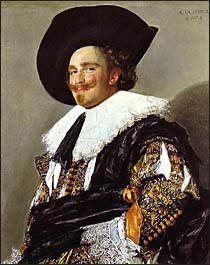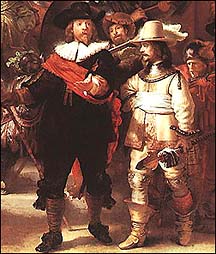
|


Frans Hals. The Laughing Cavalier. 1624.
|
“Though the Cavalier Poets only occasionally imitated the strenuous intellectual conceits of Donne, and his followers, and were fervent admirers of Jonson's elegance, they took care to learn from both parties. In fact, reading the work of Thomas Carew, Sir John Suckling, Richard Lovelace, Lord Herbert, Aurelian Townshend, William Cartwright, Thomas Randolph, William Habington, Sir Richard Fanshawe, Edmund Waller, and the Marquis of Montrose, it is easy to see that they each owe something to both styles. In fact the common factor that binds the cavaliers together is their use of direct and colloquial language expressive of a highly individual personality, and their enjoyment of the casual, the amateur, the affectionate poem written by the way. They are 'cavalier' in the sense, not only of being Royalists (though Waller changed sides twice), but in the sense that they distrust the over-earnest, the too intense. They accept the ideal of the Renaissance Gentleman who is at once lover, soldier, wit, man of affairs, musician, and poet, but abandon the notion of his being also a pattern of Christian chivalry. They avoid the subject of religion, apart from making one or two graceful speeches. They attempt no plumbing of the depths of the soul. They treat life cavalierly, indeed, and sometimes they treat poetic convention cavalierly too. For them life is far too enjoyable for much of it to be spent sweating over verses in a study. The poems must be written in the intervals of living, and are celebratory of things that are much livelier than mere philosophy or art. To put it in a nutshell, the Mistress is no longer an impossibly chaste Goddess to be wooed with sighs, but a woman who may be spoken to in a forthright fashion. Though the poems written to her may be more important to the writer than she is herself, there is no pretence that this is not the case. Poetry need not be a matter of earnest emotion or public concern. Dick might like to have a ballad, so Dick gets one. Lady X gave an admirable party, and so here is a thank you poem. On the other hand, this wedding or funeral deserves a line or two, and why not upbraid that girl for her coldness or point out to that young man that the world doesn't end simply because he's been jilted?

Rembrandt. The Night Watch. 1642.
|
It may all sound rather trivial, and much of it no doubt is; but the Cavaliers made one great contribution to the English Lyrical Tradition. They showed us that it was possible for poetry to celebrate the minor pleasures and sadnesses of life in such a way as to impress us with a sense of ordinary day-to-day humanity, busy about its affairs, and on the whole, enjoying them very much.”
Text excerpted from:
Skelton, Robin. The Cavalier Poets.
London: Longmans, Green & Co., 1960. 9-10.

Cavalier Lyricists - Cambridge History, &c.
Cavalier Poets - The Columbia Encyclopedia
Cavalier Poets - Prof. Jennifer Mooney

|
to 17th C. English Literature : Cavalier Poets
|
Site copyright ©1996-2006 Anniina Jokinen. All rights reserved.
Created by Anniina Jokinen on July 28, 2000. Last updated April 26, 2012.
|

